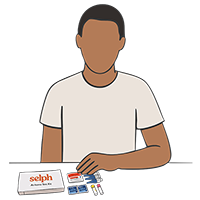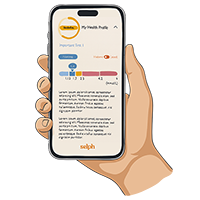Personalise your test
Add to your test
2 add-ons availableChoose how to collect your sample
5 optionsFinger-prick blood collection
Total price:
£39.00
Includes our
CRP Blood Test for Inflammation
High sensitivity CRP is a marker of inflammation in your body. You can use a high senstivity CRP blood test to pick up even low levels of inflammation which are a risk-factor for heart disease.
Our CRP Blood Test is a simple finger-prick test you can take at home and send to our NHS-testing lab for analysis. You'll receive a doctor's report with your CRP level and an explanation of what it means for your health.
What you need to know about our CRP Blood Test
High sensitivity CRP is a marker of inflammation in your body. In particular, a high sensitivity CRP test can pick up even the lowest levels of inflammation - so-called "chronic low-grade inflammation" - which can be caused by smoking, obesity, high blood pressure and potentially even diet. High sensitivity CRP is often used as a marker of heart disease risk.
What is CRP?
CRP or C-reactive protein is a protein produced by the liver in response to inflammation. We can measure the level of CRP in the blood to determine if there's inflammation in the body.
What does it mean if CRP is high?
A high CRP level can indicate inflammation in the body. This can have a number of causes including:
- Infection
- Injury
- Autoimmune conditions
- Low-grade inflammation from heart disease, fatty liver and gum disease
- Vigorous exercise
- Smoking, obesity and high blood pressure
What level of CRP is concerning?
Inerpretation of CRP level depends on the context. For example, when we're looking for chronic, low-grade infalmmation then a CRP over 1mg/L is high. But if we're looking at CRP in someone with an acute infection, such as in appendicitis, then a CRP over 10mg/L is considered high and it can easily go over 100mg/L.
If you're otherwise well, with no sign of infection or injury (not even a cold!), then your CRP level should be less than 1mg/L. If it's higher than this, then it's worth investigating further.
How it works

Do your test
You'll get your kit next-working day.
Collect your sample at home and send it back to our UKAS-accredited lab for analysis.

Get rapid results
We'll let you know when the lab have received your sample for analysis.
You'll get your results and doctor's report in your online dashboard. You'll also be able to download your formal lab report to share with your GP if you wish.

Improve your health
Numbers are useful but it's what you do with them that counts.
We'll give you advice on how to improve your health based on your results. You can also book a consultation to discuss your results with one of our doctors (costs extra).
CRP Blood Test FAQs
The CRP blood test is very sensitive and will pick even low levels of inflammation. This means that you should avoid taking the test if you have any acute infections such as a cold or flu or an injury. It's also best not to test until a few days after very strenuous exercise (such as running a marathon).
Reducing your CRP level really depends on the cause. If there's acute inflammation from an infection, injury or inflammatory condition such as inflammatory bowel disease then treating the underlying cause will reduce the CRP level.
On the other hand, if the high CRP level is related to chronic, low-grade inflammation then lifestyle changes can help. For example, losing weight, stopping smoking, reducing alcohol intake, exercising and improving your diet can all reduce CRP levels. In general, a Mediterranean-style diet is associated with lower CRP levels.
Occasionally there are specific but hidden issues that are causing a low-grade inflammation. For example, gum disease is a common cause of low-grade inflammation and high CRP levels. In these cases, treating the gum disease can reduce the CRP level. Similarly, some individuals may be sensitive to certain foods such as wheat or dairy, in which case removing these foods can reduce CRP levels.
With a few exceptions, foods don't directly cause inflammation or protect against it. Some dietary patterns are associated with higher levels of CRP. For example, the "Western diet" which is high in processed foods, sugar and unhealthy fats is associated with higher CRP levels. On the other hand, the Mediterranean diet which is high in fruit, vegetables, whole grains, nuts, seeds and olive oil is associated with lower CRP levels. But this is an association, not causation. It's likely that the Mediterranean diet is associated with lower CRP levels because it's also associated with lower levels of obesity, high blood pressure and diabetes. All of which raise CRP levels.
Similarly, if your CRP is high because you have gum disease or smoke then eating a so-called "anti-inflammatory" diet won't help. You need to treat the gum disease and stop smoking.
Talking about foods as "pro-inflammatory" or "anti-inflammatory" is an oversimplification that misses the point. It's far more helpful to look at the impact that your diet is having on your weight, blood pressure, cholesterol levels and blood sugar levels.
A food "intolerance" or "sensitivity" is when someone experiences symptoms, such as bloating diarrhoea or rashes, after eating certain foods. This is different from a food "allergy" which is a specific type of immune reaction to a food.
In some individuals, food intolerances can cause low-grade inflammation and a slight increase in CRP. In these cases, it can be useful to try excluding a potential food cause from the diet and monitoring the effect on the CRP and any symptoms. Dairy and wheat-containing products are the commonest culprits.
However, it's important to point out that in the majority of people, wheat and dairy do not cause inflammation. In fact, dairy consumption has consistently been shown to be associated with lower levels of inflammatory markers in the bloodref.
Still have questions?
If you have any questions, we're here to help. Our customer service team is hands-down the best you'll ever deal with. They're smart, friendly, knowledgeable and will get back to you in a flash.
We've got the stats to back it all up.
When it comes to health, you want to know you’re in safe hands. We’ve got decades of experience, and we’ve got the stats to prove it.
20+
Years in healthcare
65,000+
5 star reviews

1 million+
Happy customers
2 million+

Our Privacy Promise
Your health is yours. It's personal. That's why we're committed to keeping your data safe and secure. Here's how we do it:
See our Privacy Policy and our Terms of Service for more info.






